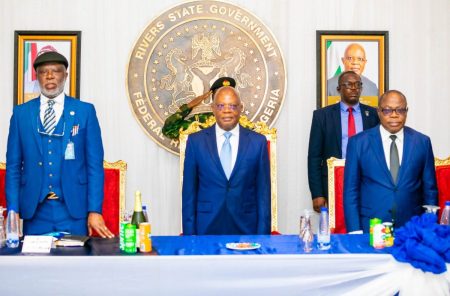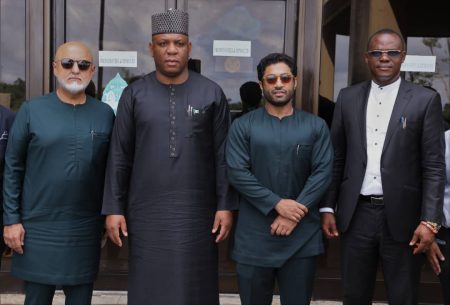16 April 2012, Sweetcrude, LAGOS – NIGERIAN insurance companies have alleged that the country loses about N45 billion annually due to the preference given to foreign ship owners and their choice of insurers over the indigenous companies in the lifting and importation of fuel.
They further alleged that the Nigerian National Petroleum Corporation, NNPC, deliberately sidelined insurance companies from participating in the insurance of imported fuel both locally and internationally.
According to them, the NNPC sets unnecessary bulwarks that make it impossible for Nigerian insurance companies to participate in the insurance of imported oil business, thus shortchanging Nigeria as the country loses as much as N3.7 billion monthly in freight insurance that it should be earning. This is happening despite the existence of the Cabotage law in Nigeria.
Last year, Mr. Fola Daniel, Commissioner for Insurance, said that the National Insurance Commission (NAICOM) would not permit risks to be underwritten offshore unless local capacity has been exhausted. Daniel also said the Nigerian Oil and Gas Content Development Act 2010 desired that local insurers and re-insurers will be able to write a minimum of 45 per cent of oil risks in 2007, and 70 per cent at the end of last year, but lamented that only 33 per cent of the risks in the sector was retained locally.
He attributed the development to what he called absence of an enabling law in the past to back up the policy initiatives, adding that with the coming into effect of the Local Content Act, in accordance with Insurance Act 2003 and the National Insurance Act 1997, and the release of the guidelines for oil and gas business in Nigeria, 100 per cent, 70 per cent and 40 per cent of all life, non-life and marine insurance risks in the Nigerian oil and gas industry must be placed with insurers in Nigeria.
According to Daniel: “No risk can be placed off-shore without the written approval of the Commission, which is required to ensure that Nigerian local capacity has been fully exhausted.”
But, NNPC spokesperson, Dr Levi Ajuonumah, denied the allegation, saying that all the vessels coming into the country were insured but refused to divulge if they were locally or internationally insured.
An insurance expert who prefers to be anonymous said that all these notwithstanding; the insurance industry has been shortchanged all along. According to him, the industry was shortchanged when the exact quantity of petrol on which subsidy was being charged were not known as there were no verifiable records of importation into the country.
The industry was also shortchanged when the NNPC refused to divulge its volume of imports and was said not to have paid any duty to the Federal Government on imported petrol since 2002 owing to a presidential waiver. Prior to 2002, the corporation allegedly owed the Nigeria Customs Service over N46 billion as accrued duty on petrol.
The insurance industry was shortchanged yet again when mother vessels berthed off-shore to discharge products instead of going to designated ports and while on the high seas, the vessels discharged products into smaller vessels for onward delivery to the ports and because Customs personnel were barred from examining offshore vessels, they could not determine the exact quantity of products the vessels brought into the country.
It will be recalled that the Customs and Excise Management Act provides that vessels from foreign countries must berth at the ports of destination, not at unapproved locations.
Operators’ grouse
Grieved by these shortchanges, insurance operators have said that it is high time the government recognised the relevance of insurance for economic growth.
According to Paschal Egerue, Managing Director of Mainstreet Insurance Brokers, insurance fraud include non-declaration of transactions to NAICOM, fronting for overseas insurance companies, bearing uninsured risks or inappropriately reinsured risks, premium loading or premium under-declaration, round tripping, among others. Egerue stressed that all fuel importation ought to have been duly insured by the oil majors.
Chairman of Nigerian Insurers Association, NIA, Mr. Olusola Ladipo-Ajayi, said that insurance operators do not have anything to show that goods worth the amount claimed by officials in the oil sector have been insured in the Nigerian market as even government officials could not agree on figures.
Ladipo-Ajayi said: “The Central Bank of Nigeria gives a figure different from what the NNPC gave and different from what the Ministry of Finance gives. Everything is just working at cross purposes but we do not have any figure to come near anything that anyone of them has said.”
Meanwhile, Egerue noted that the Local Content Act was enacted after the debate as to the capacity of the nation’s insurance industry to absorb the risks of the Nigerian oil and gas upstream and downstream sectors and NAICOM has since moved in to enforce the sections of the Insurance Act relating to oil and gas insurance and reinsurance in Nigeria.
According to him, there is a school of thought that principally sees insurance transaction in oil and gas sector as ridden with fraud. The Nigerian insurance industry has been losing billions of dollars to these occurrences.
In his words: “The fuel subsidy argument has therefore brought to the fore the likely quantum of these frauds. The crucial question is, since this subsidy may also encompass insurance premium reimbursement, who computes it and who has been taking it? In any case, how has the premium for the massive marine cargo insurance on these fuel importations been handled all these years?
“Most of the ship-loads of fuel are insured on clause C at very ridiculous rates while possible reimbursements may be calculated on clause A on exaggerated rate basis. There are also the experiences of incessant certificate cancellations and substitutions as these importers play on the frequency of importation to cheat the insurance industry. These irregularities are, however, cleverly reconstructed whenever a loss occurs. Thus, insurance companies are seen to exist only to bear losses and not to earn income from this huge racket.”
Mr. Yemi Soladoye, an insurance consultant said that the law actually stipulates that all imports in Nigeria must be insured through a local underwriter, adding: “If you break that down, it is not saying all imports must be insured but if an import will be insured, it must be through a local underwriter.”
Managing Director of FBN Life Assurance Company Limited, Mr. Val Ojumah, stated that the law says all import and export into Nigeria must be insured by Nigerian insurance industry, but since the government refuses to do so, insurers cannot force it to comply.
He said: “If they decide to disobey the law, it is not in our place to actually enforce the law. We have the police and we have the government to enforce the law.”
According to him, most government imports are not declared to insurers because the government that brings in such imports does not bother to insure them.
“Now if you take a vessel laden with PMS from Port-Harcourt, turn around on the high sea and bring it to Lagos and record it as import, do you want me to insure that? That could not be declared to me. Given the fact that in some of these cases they didn’t buy insurance and personally, I believe they wouldn’t buy insurance because insurance operators cannot be part of what they were doing. Insurance cannot insure a fraudulent situation.”
Ladipo-Ajayi stressed that the insurance sector did not benefit from the huge figures being bandied about. He said: “There is a lot of information that came out of the fuel subsidy probe. However, with that amount of fuel importation, if the Nigerian law that makes it compulsory for the importation of goods into Nigeria to be insured has been observed, you would have seen it in our reports. But I don’t think we have anything to show that goods worth that amount have been insured in the Nigerian market. Even the government officials in charge cannot agree on figures.”
The way forward
The Federal Government having declared that it will be issuing new import licences to fuel importers and that it is restricting the number of companies with closer monitoring of how the volumes are allotted and filled, insurance operators are calling on the government to be true to its word.
According to Soladoye, the government must begin to imbibe the insurance culture by pegging all its policies around insurance and must ensure that all subsequent fuel imports are duly insured with local insurers.
For Egerue, the capacity of the total market should be determined and how to develop the will to enforce its saturation before cession to any other markets. The government is also to be encouraged to create a conducive environment – tax, regulations etc. – to enable the country emerge as a hub for captive insurance outlets of the multinational oil majors.
He said: “The NIA working in concert with NAICOM and other trade and professional groups should commence an immediate audit of the insurance premium volume of the oil and gas sector with the aim of tracking the flow of these premiums and ensuring that the right professional steps are being taken in providing adequate insurance cover for what should rightly be termed a national exposure.”
Managing Director of Custodian and Allied Insurance Plc, Mr. Wole Oshin, stated: “In other economies, government picks on insurance for progress. Unfortunately, government in Nigeria doesn’t even know insurance.”
He stressed that the government needs to recognise insurance, adding: “A situation where budgets are discussed and insurance industry is not even invited means that government does not understand the importance of insurance. Our primary and fundamental objective as an industry is to stabilise the economy, produce savings and stabilise the risk of government.
“But government has not looked at insurance because they don’t understand it because if they do, then they will give priority to insurance. In advanced countries, the government can’t do anything without the insurance industry. They can’t even make policies without insurance. Here, insurance is not in the centre stage even when it is obvious that it is a critical thing,” Oshin stated.
For Egerue, there should be a proper system to scrutinise, audit and sanitise the insurance transactions of the oil tycoons and their local conspirators especially with regards to fuel importations.




